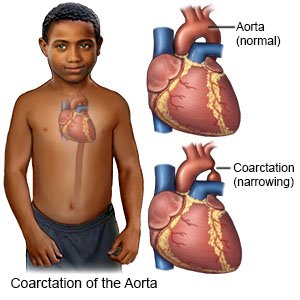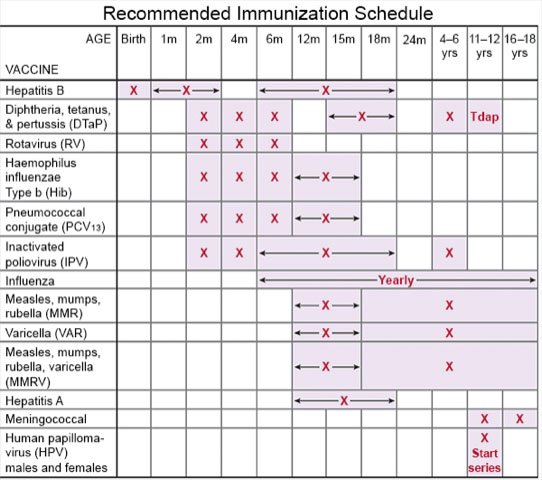Coarctation of the Aorta
Medically reviewed by Drugs.com. Last updated on Aug 4, 2025.
Coarctation of the aorta (COA) is a birth defect that causes a narrowing in your child's aorta. The aorta is the large blood vessel that moves blood from your child's heart to the rest of his or her body. COA makes the heart work harder than usual to pump blood and oxygen to your child's body. Over time, this may weaken the heart muscle and cause heart failure.
 |
DISCHARGE INSTRUCTIONS:
Call your local emergency number (911 in the US) if:
- Your child has severe chest pain.
- Your child has trouble breathing or sudden shortness of breath.
- Your child coughs up blood.
- Your child loses consciousness or stops breathing.
- Your child has any of the following signs of a stroke:
- Part of his or her face droops or is numb
- Weakness in an arm or leg
- Confusion or difficulty speaking
- Dizziness, a severe headache, or vision loss
Return to the emergency department if:
- Your child is too dizzy to stand.
- Your child's heart is beating faster than usual.
- Your child has swelling in his or her legs or ankles.
- Your child has severe abdominal pain or his abdomen is larger than usual.
Call your child's doctor if:
- Your child has a fever.
- Your child has chills, a cough, or feels weak and achy.
- You have questions or concerns about your child's condition or care.
Medicines:
- Blood pressure medicine helps control or lower your child's blood pressure.
- Give your child's medicine as directed. Contact your child's healthcare provider if you think the medicine is not working as expected. Tell the provider if your child is allergic to any medicine. Keep a current list of the medicines, vitamins, and herbs your child takes. Include the amounts, and when, how, and why they are taken. Bring the list or the medicines in their containers to follow-up visits. Carry your child's medicine list with you in case of an emergency.
Care for your child:
- Do not smoke near your child. Do not let your older child smoke. Nicotine and other chemicals in cigarettes and cigars can cause lung and heart damage. Ask your healthcare provider for information if you or your older child currently smoke and need help to quit. E-cigarettes or smokeless tobacco still contain nicotine. Talk to your healthcare provider before you or your older child use these products.
- Feed your child heart-healthy foods. Feed your child more fresh fruits and vegetables. Limit foods high in sodium, such as canned and processed foods. Replace butter and margarine with heart-healthy oils such as olive oil and canola oil. Other heart-healthy foods include walnuts, whole-grain breads, low-fat dairy products, beans, and lean meats. Fatty fish such as salmon and tuna are also heart healthy.

- Ask your child's healthcare provider if you need to limit his or her activity. Your child may need to avoid strenuous activities and sports to decrease his or her symptoms. Strenuous activities include running, lifting, and swimming.
- Get your child vaccinated. Vaccines help decrease your child's risk for infections. Infections can make your child's condition worse. Your child's healthcare provider can tell you which vaccines your child needs and when to get them.

Follow up with your child's cardiologist as directed:
Your child will need to return for more tests. Write down your questions so you remember to ask them during your child's visits.
© Copyright Merative 2025 Information is for End User's use only and may not be sold, redistributed or otherwise used for commercial purposes.
The above information is an educational aid only. It is not intended as medical advice for individual conditions or treatments. Talk to your doctor, nurse or pharmacist before following any medical regimen to see if it is safe and effective for you.
Learn more about Coarctation of the Aorta
Treatment options
Care guides
Further information
Always consult your healthcare provider to ensure the information displayed on this page applies to your personal circumstances.
